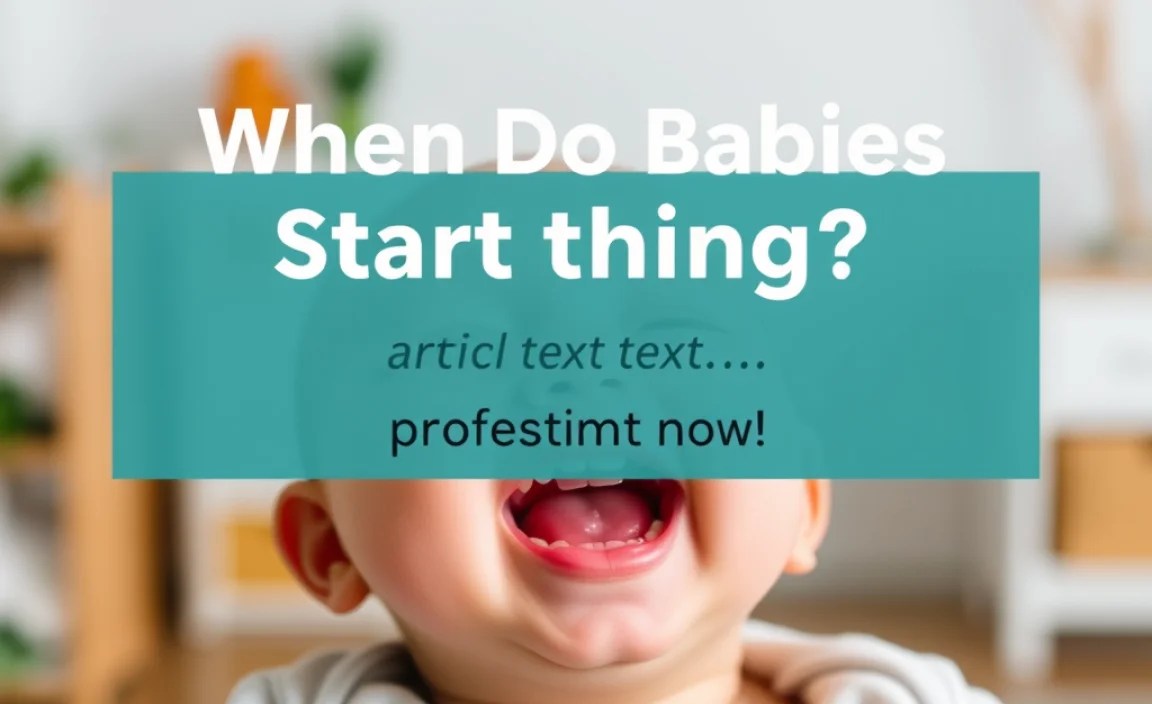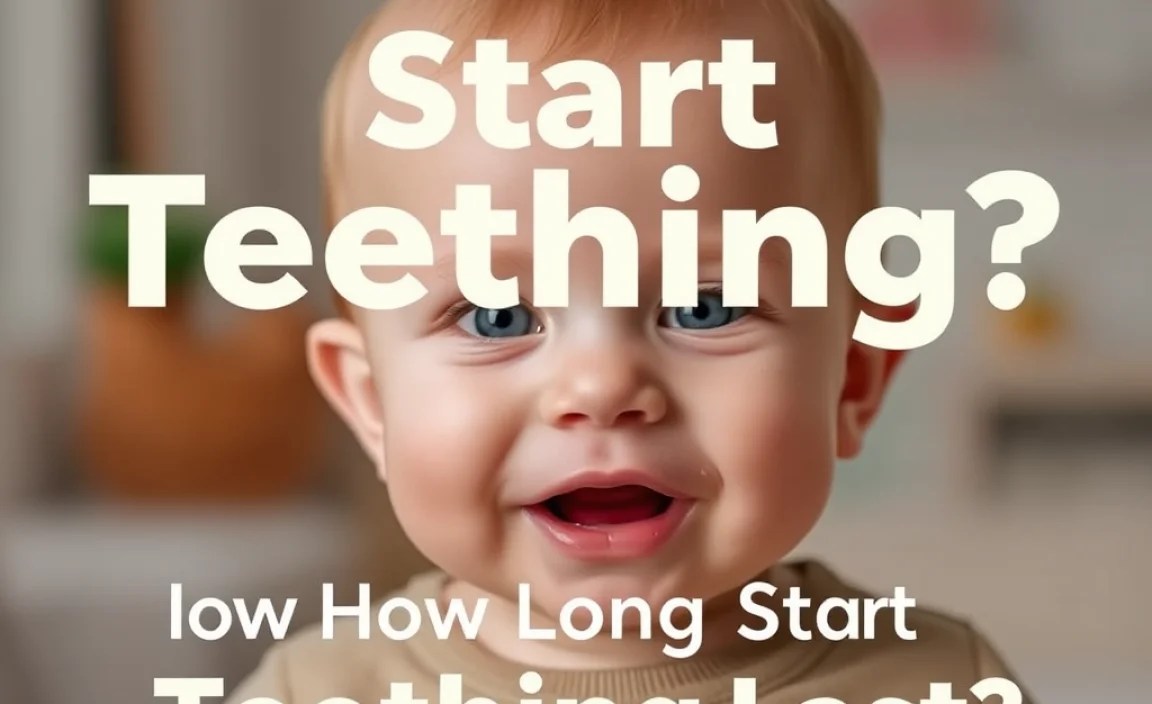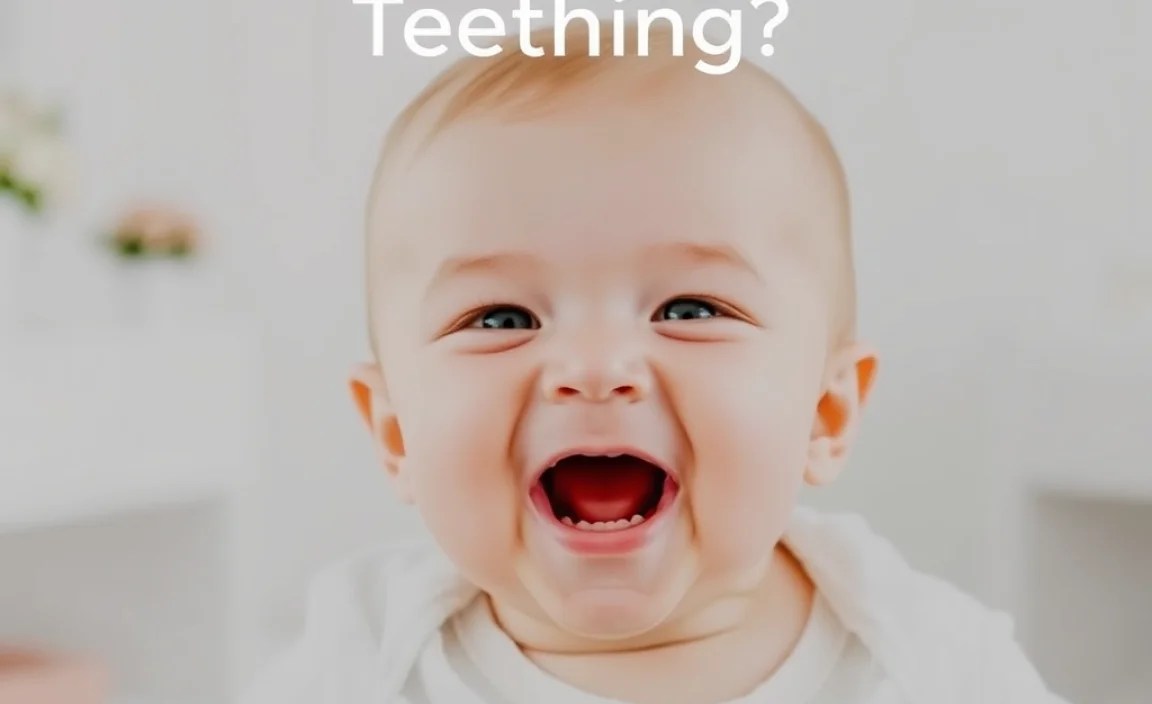When do babies start teething? It’s a common question for new parents. Imagine a baby, chewing on their favorite toy. Suddenly, they seem fussier than usual. Could it be teething time? Understanding when babies start teething helps you prepare.
At A Glance
Key Takeaways
- Most babies start teething around 6 months old.
- Teething can cause drooling and irritability in babies.
- Every baby is different, and teething can vary greatly.
- Teething toys can help soothe a baby’s gums.
- When do babies start teething? Check with your pediatrician.
When Does Teething Begin?

When do babies start teething? Most begin around six months. Some start earlier or later. Teething depends on genetics and health. Babies may drool or chew on things. Parents should watch for these signs. It’s an exciting time, but also challenging. Some babies become fussy or have trouble sleeping. Knowing what to expect helps parents stay calm.
- Teething usually starts around six months.
- Some babies start as early as four months.
- Late teething is around ten months.
- Drooling is a common sign of teething.
- Chewing on toys can be a teething indicator.
- Fussiness is often linked to teething.
- Teething pain varies between babies.
Teething is an exciting milestone. It shows your baby is growing. But it can be tough. Babies might wake up more at night. They might seem unhappy. Preparing for teething helps. Parents can offer teething toys. These toys soothe sore gums. Cold washcloths can help too. Knowing when to expect teething eases worries.
Fun Fact or Stats : About 80% of babies start teething by six months.
Early Teething Signs
What are some early signs of teething? Look for drooling, as babies often drool more. Chewing on hands or toys is another sign. Babies may become fussy or cry more. Could this be teething? Sometimes, babies develop a slight fever. But always check with a doctor if you’re unsure. Teething can be a bumpy ride, but it’s normal.
Why Do Babies Drool?
Why do babies drool so much? It’s partly because they’re starting to teethe. Drooling softens the gums, making it easier for teeth to break through. Some babies drool more than others. It’s perfectly normal for babies to have a wet chin. Keep bibs handy to catch the drool. Remember, drooling is a positive sign of growth.
How to Ease Teething Pain
How can you help a teething baby? Try offering a cold washcloth. This soothes tender gums. You can also give teething rings. Some parents use special necklaces, but always supervise. Over-the-counter teething gels may help. However, consult a doctor first. Remember, every baby is different. Patience and comfort go a long way.
How Long Does Teething Last?

Teething can seem endless for some parents. But how long does it really last? For most babies, teething continues until age three. The first tooth usually appears around six months. Then, new teeth come every month or so. This can last until the child is three years old. That’s around when they have a full set of 20 baby teeth.
- Teething starts around six months.
- Some babies teeth until age three.
- New teeth appear every couple of months.
- Most babies have 20 teeth by age three.
- Teething causes discomfort on and off.
- Regular check-ups are important during teething.
- Frequent cleaning helps keep new teeth healthy.
Teething might feel long, but it’s a vital part of growth. Each new tooth is a step forward. Babies learn to eat and talk with these teeth. Parents should celebrate each tiny tooth. Keep in mind, the discomfort is temporary. Soon, your baby will have a full, dazzling smile.
Fun Fact or Stats : By age three, children usually have 20 primary teeth.
When to Expect the First Tooth
When do babies start teething with the first tooth? It often appears around six months. But don’t worry if it takes longer. Some babies get their first tooth as late as 12 months. Others may see it at four months. Remember, every baby is unique. The timing of teething varies widely.
Teething Facts for Parents
Did you know some babies are born with teeth? These are called natal teeth. They’re rare but happen sometimes. Don’t be alarmed. Your pediatrician can advise on care. Teething affects sleep, too. Babies may wake up more often. Parents should comfort them with a gentle touch. Keep teething toys nearby at night.
The Teething Timeline
What’s the typical teething timeline? It begins at six months with the first two teeth. By 12 months, babies may have eight teeth. At 18 months, they might have 12 teeth. By age two, most children have 16 teeth. Finally, by three years, they will have all 20 baby teeth. Each milestone is a joy to witness.
Common Teething Symptoms

Teething symptoms vary, but there are common signs. Babies often drool more. They might develop a rash on their chin from drool. Chewing on objects becomes frequent. Some babies refuse food due to gum pain. Mild fever may occur. But always check with a doctor if fever persists. Parents should look for these signs.
- Drooling increases during teething.
- Babies chew on toys and hands more.
- Gum irritation is common.
- Mild fever might accompany teething.
- Appetite can decrease.
- Babies might cry more often.
- Teething can disrupt sleep patterns.
Recognizing these symptoms helps parents act quickly. They can offer teething toys or cold items. Patience is key. Teething is a natural process, not an illness. Babies need comfort and understanding. Parents should remember this phase will pass. Soon, their little one will proudly show off a toothy grin.
Fun Fact or Stats : About one in every 2,000 babies is born with a tooth.
Dealing with Drool Rash
What can you do about drool rash? It’s common during teething. Keep the baby’s face dry. Use soft cloths to pat away drool. Apply baby-friendly lotion to soothe the skin. Bibs protect clothes and skin. Choose bibs with absorbent material. Parents should clean bibs regularly to avoid irritation.
Teething and Sleep Changes
How does teething affect sleep? Babies may wake more during teething. They feel uncomfortable and seek comfort. Offer a teething ring before bed. Keep the room calm and quiet. Establish a soothing bedtime routine. Some babies might need more cuddles. It’s a temporary phase, and sleep will improve.
Managing Baby’s Appetite
Is your baby eating less while teething? Gum discomfort can affect appetite. Offer soft foods that are easy to chew. Smoothies or mashed vegetables work well. Cold foods can also soothe the gums. Keep meals stress-free. Don’t force the baby to eat. Appetite usually returns after teething discomfort fades.
Teething Remedies for Babies

Parents want to ease their baby’s teething discomfort. What are some safe remedies? Cold items soothe gums. Use a chilled teething ring. A cold washcloth is another option. Some parents give chilled fruit in a mesh feeder. Over-the-counter gels can help, but consult a doctor first. Always supervise when using teething jewelry.
- Cold items soothe teething pain.
- A chilled teething ring is effective.
- A cold washcloth relieves sore gums.
- Chilled fruit in a mesh feeder is safe.
- Over-the-counter gels can ease pain.
- Always supervise teething jewelry use.
- Consult a doctor before trying new remedies.
Trying different remedies helps find what works best. Remember, each baby is different. Be patient and attentive. Offer comfort and love during this time. A little extra care makes a big difference. Soon, teething will be a thing of the past. Enjoy the journey as your baby grows and changes.
Fun Fact or Stats : Teething typically lasts about two years until all teeth appear.
How to Use Teething Toys
How can teething toys help? They provide something safe for babies to chew. Choose toys made of silicone or rubber. Ensure they are BPA-free. Cool them in the fridge for extra relief. Supervise play to avoid choking hazards. Clean toys regularly to maintain hygiene. Teething toys can be a lifesaver during this phase.
Teething Necklaces: Are They Safe?
Are teething necklaces safe for babies? They are popular but require caution. Always supervise when your baby wears one. Ensure the necklace is breakaway to prevent choking. Use necklaces during the day, not at night. Check for signs of wear and tear. Consult your pediatrician before using teething jewelry.
When to Seek a Doctor’s Advice
When should you see a doctor about teething? If your baby has a high fever, it’s time to call. Persistent crying or refusal to eat is also concerning. Check with a doctor if teething symptoms are severe. Regular check-ups ensure teeth grow properly. A doctor can provide advice and reassurance. Don’t hesitate to seek help.
Comparison of Teething Remedies

| Teething Remedy | Pros | Cons |
|---|---|---|
| Chilled Teething Ring | Soothes gums quickly | Needs regular cleaning |
| Cold Washcloth | Easy and accessible | Can become messy |
| Teething Gel | Provides quick relief | Consult doctor first |
| Mesh Feeder with Fruit | Safe and tasty | Requires supervision |
Conclusion
Teething is a significant milestone in a baby’s life. Most babies start teething around six months. Each baby is unique, and teething can vary. Parents should be ready with teething toys and remedies. Comfort and patience are vital. Enjoy your baby’s growth and new smile. Always consult a doctor if you have concerns.
FAQs
Question: What age do babies typically start teething?
Answer: Most babies start teething around six months of age. However, some babies may begin as early as four months. Others might not start until seven or eight months. Every baby is different, and teething times can vary widely.
Question: Can a baby be born with teeth?
Answer: Yes, some babies are born with teeth, known as natal teeth. This is rare but does happen. If your baby is born with teeth, consult your pediatrician. They will provide guidance on how to care for the natal teeth safely.
Question: How can I help my teething baby sleep?
Answer: Offer a cool teething ring before bedtime. Create a calm sleeping environment. Maintain a soothing bedtime routine. Comfort your baby with gentle touches or cuddles. Remember, teething is temporary, and sleep patterns will improve over time.
Question: What are the signs of teething?
Answer: Common signs include increased drooling, gum irritation, and chewing on objects. Babies might also become fussy and have trouble sleeping. Some experience a mild fever. Always check with a doctor if fever persists or if symptoms seem severe.
Question: When do babies stop teething?
Answer: Teething usually ends around age three. By then, most children have a full set of 20 primary teeth. Teething can vary, but most children complete teething between ages two and three.
Question: Should I use teething gels for my baby?
Answer: Teething gels can provide quick relief by numbing the gums. However, it’s important to consult with a doctor before using them. Not all gels are suitable for young babies, and some might have side effects.